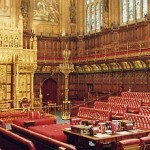 Peter Hennessy is one of our foremost contemporary historians. He was introduced into the Lords on 25 November and he made his maiden speech yesterday during the Second Reading debate on the House of Lords Reform Bill (the Steel Bill). He made clear where he now stands on the issue of an elected House:
Peter Hennessy is one of our foremost contemporary historians. He was introduced into the Lords on 25 November and he made his maiden speech yesterday during the Second Reading debate on the House of Lords Reform Bill (the Steel Bill). He made clear where he now stands on the issue of an elected House:
“I was once in favour of an elected Chamber—a British senate of 100 legislators, elected on the basis of proportional representation by huge constituencies that embraced city, town and countryside, with one-third up for election or re-election every five years. I have changed my mind; indeed, it would have been improper to have applied for appointment to the Cross Benches of your Lordships’ House if I had not. There are two chief reasons why I have changed my mind. First, there is the high and continuing utility of having a group of people somewhere in the legislative process who are sensitive to politics and government but are not themselves partisan in a party-political sense. Secondly, in most trades, crafts, professions and walks of life, we are ever keener to widen the confluence of backgrounds, knowledge and experience when recruiting. In my judgment, appointment rather than election will remain the best and primary instrument for achieving this if it is a goal that we share.
Quite apart from election, which would create the danger of a replica Chamber that, by its very existence, would promptly inspire a tussle in terms of relative power with the other place, it is very difficult to imagine that elections would sustain the flow of experience and knowledge that the appointments system provides for your Lordships’ House, especially regarding those with a background in science and technology, business and industry. To rise in the other place, you need first to make your way there in your 30s or early 40s. With the best will in the world, that is usually too soon and too young to have acquired fully professional depth in the laboratory or the boardroom.”
Another who has changed his mind, albeit in a less clear-cut manner, is Timothy Garton Ash. In an article in The Guardian, he has recognised the strengths of the House and wishes to preserve them – even if his proposed changes won’t achieve that.

your 30s or early 40s
And in your 60s you give up the idea of pluralist democracy entirely, or in your 40s or 50s, if you re old before your time.
Go on leave it to the young ones!
It’s a club and he wanted to belong so he changed his mind! Here are the reasons…!
Totally agree with Lord Hennessy though I feel he`s a bit out of kilter with ” are not themselves partisan in a party-political sense.”
If only that were true, lately here we have seen a deeply political partisan edge from some of the bloggers. It`s something undesireable and comes of course from the other place but would be far worse if an elected House were put in place.
I read some of the Steel Bill and the debate seemed to get stuck on for or against an elected House which was a shame. Of course the Government side had their answer “We`re doing our own reform research and a bill will be forthcoming”. Presumably they want to do their own so it isn`t biased in anyway, shape or form. LOL
God bless the Government, preferably with some brains !
All I would ask of ‘tomorrow’s world’ is to look at the evidence and with reason consider Parliament not so much as a legislative body but a version of ‘Guanxi’ or relationships within the big society. In true Guanxi it is the relationship that matters with rules being of secondary importance. Blood is thicker than water you might say.
The place to study the nature of ‘Guanxi’ in Parliament is to examine the register of member interests in both houses. The elected Commons details a list of member financial interests whilst the Lord’ does not yet the Lords’ is intimately involved with legislation. The reason for this is that the Lords’ can no longer give formal scrutiny to money bills therefore it is unnecessary to report publicly the financial income of its members.
The public can rid itself of members of the Commons by the outcome of a General Election but in an appointed House of Lords this ‘cannot be done’ without the assistance of an act of Parliament.
Ref: Usage Examples
http://en.wikipedia.org/wiki/Guanxi
House of Commons
The Register of Members’ Financial Interests
(Formerly Register of Members’ Interests)
Register of Members’ Financial Interests 2010-11
http://www.publications.parliament.uk/pa/cm/cmregmem.htm
Register of Lords’ Interests
Full text of the Register-HTML version (29 November 2010)
http://www.publications.parliament.uk/pa/ld/ldreg.htm